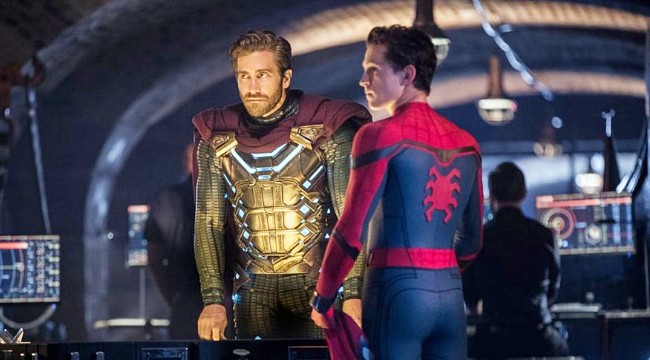
WARNING: This article contains massive spoilers for Spider-Man: Far From Home.
The first full trailer for Spider-Man: Far From Home introduced Jake Gyllenhaal’s Quentin Beck as an interdimensional traveler whose Earth had been destroyed by what he called the “elementals.” Or, as a visibly excited Peter Parker exclaimed, “You’re saying there’s a multiverse!?” It was the nerd word heard around the world, and with the trailer’s introduction of the “multiverse” concept to mainstream Marvel audiences, many — myself included — wondered if this might be the MCU’s next big thing.
Unfortunately, though not at all surprisingly, Beck’s claim about being from an alternate Earth turned out to be yet another illusion. The multiverse, the elementals, Mysterio — none of it was real. It was all a big lie meant to convince Peter, super spies Nick Fury and Maria Hill, and the rest of the world that Beck and his team were the real deal. Though as much as this plot twist fits with Mysterio’s comic book origins, and despite the fact that it works really well in Far From Home, it feels like a missed opportunity for Marvel.
Or, more specifically, the fact that the multiverse Beck spoke of does not exist may end up being one of Marvel Studios’ most puzzling creative decisions.
So, what’s the problem? Why should the fact that Beck lied about the multiverse even be an issue? As I explained in a previous piece about the matter, the multiverse could potentially offer Marvel a way out of the massive corner it has arguably written itself into after 11 years and 23 interconnected movies. Ever since Nick Fury surprised everyone in the Iron Man post-credits scene, every single entry in the MCU has existed in a delicate (and not always entirely consistent) causal relationship with the other films. If the Infinity Stones were explained in one movie, all six of them were sure to turn up in another.
Interconnectivity is great! Though after so many movies’ worth of repetitive storytelling, theatergoers might start getting bored. And aside from possibly losing money, Marvel could lose out on talent, too. They already have with the likes of Edgar Wright (Ant-Man), Ava DuVernay (Black Panther), and Patty Jenkins (Thor: The Dark World). Why? Because the studio’s tendency for keeping a very tight leash on its filmmakers is not only well documented, it’s also creatively stifling. Or, at least it can be.
Yes, the dissolution of the so-called “Creative Committee” after Captain America: Civil War gave Kevin Feige the power to let directors like Taika Waititi, James Gunn and Ryan Coogler make their respective movies however they wanted to. (Within reason, obviously.) Yet they’re still all supposed to make these films fit squarely into a precise pattern that leads to the next entry, the next team-up tentpole, or both. But what if this wasn’t always the case? What if, with the narrative strength of the multiverse concept, Marvel Studios started hiring filmmakers and encouraging to really make these titles their own — regardless of whichever past or future movies they do or don’t connect to?
Again, as previously discussed, DC Comics and Warner Bros. are already doing this with Todd Phillips and Joaquin Phoenix’s upcoming Joker movie, Gunn’s Suicide Squad sequel/reboot hybrid, and James Wan’s Aquaman horror spinoff. The closest upcoming Marvel comparison is its upcoming What If animated series on Disney Plus, but even then, the rest of its original content for the new streamer is going to tie directly into the MCU’s storylines. In other words, Marvel is playing it safe.
Thankfully, opportunities for creative exploration that could very well help Marvel loosen these shackles, if accepted or championed by Feige and other studio executives, are plentiful. Just last week, Legion creator (and would-be Doctor Doom filmmaker) Noah Hawley revealed that he had recently spoken with Feige about all things Marvel. And he had some pretty interesting things to say:
“I did sit down with [Marvel Studios’ president] Kevin Feige recently and I said that I look at myself as sort of the Marvel R&D department. I know the genre can do all of these amazing things that [the Marvel Cinematic Universe] is doing, but my feeling is, what else can we do with it? Can we make it surreal? Can we make it musical? Not as a gimmick, but all of these techniques are about putting you into the subjective experience of these characters.”

Legion has proven to be one of the trippier Marvel-adjacent properties in the past few years. Just imagine how much more creatively diverse, let alone entertaining, the MCU could be if it had someone like Hawley in its corner? A Dazzler concert film? A Wonder Man comedy special? Or, seeing as how the studio would most likely want to play it safe, what if future movies deployed elements of these genres and others? It could very well happen, and to keep everything at least loosely tied together — to whatever the central arc is at that moment — the easiest narrative device they could use would be the multiverse. Everything would still be connected and different, simultaneously.
This doesn’t necessarily mean that the multiverse will never come up again in Phase Four or beyond. After all, the Ancient One did speak of it while explaining the nature of magic in Doctor Strange. The concept already has a foothold in the MCU, albeit a small one, and if they ever decide to put it to use, then they’ll always have this brief line of dialogue to fall back on. But, let’s be honest, it’s Beck’s use and abuse of the idea in Far From Home that has taken center stage. It would be one hell of a retcon if Marvel Studios ever decided to change their minds.
